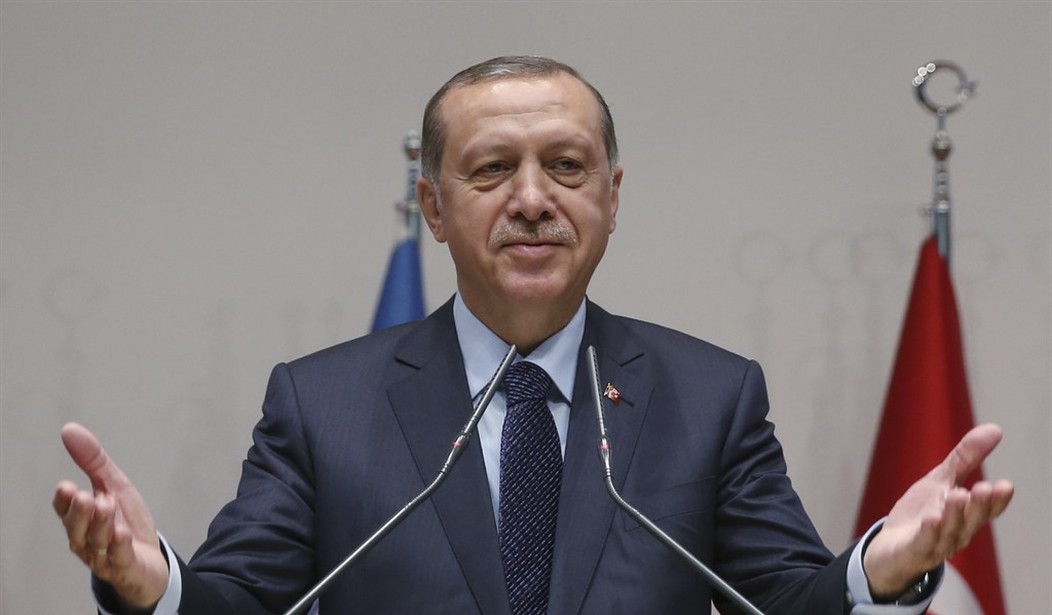Next week, Turkish president Recep Tayyip Erdogan will come to Washington to meet with Donald Trump, and despite the calendar, the weather prediction already looks … mighty chilly. The White House announced yesterday that the US would arm the YPG, an army of Syrian Kurds, as part of their ground effort to seize Raqqa, the “capital” of ISIS. Turkey’s armed forces just attacked the YPG and consider them a terrorist organization:
President Trump has approved a plan to arm Syrian Kurds so they can participate in the battle to retake Raqqa from the Islamic State, a strategy that has drawn deep opposition from Turkey, a NATO ally.
American military commanders have long argued that arming the Y.P.G., a Kurdish militia fighting alongside Syrian Arab forces against the Islamic State, is the fastest way to seize Raqqa, the capital of the militants’ self-proclaimed caliphate. …
A high-level delegation of Turkish officials was informed of the decision by Lt. Gen. H. R. McMaster, Mr. Trump’s national security adviser, when they visited the White House on Monday, and the Pentagon announced the move on Tuesday.
Reuters reported on the controversy this morning before Turkey offered any formal response:
Erdogan’s government has had time to respond now, and are demanding that Trump reconsider his support for the Kurds. The statement from Erdogan’s deputy seems designed to rankle Trump by accusing him of following Barack Obama’s foreign policy:
Turkish Deputy Prime Minister Nurettin Canikli criticized the announcement as a mere continuation of Obama’s strategy.
“The Trump administration’s support for a terrorist organization is not acceptable,” Canikli told Turkey’s A Haber news channel.
“We believe, we hope, that the American administration will say no to this wrongdoing and give up this policy. This policy will not bring any benefit to anybody.”
The Trump administration isn’t likely to bend on this point. Trump pledged to destroy ISIS with direct action, rather than leading from behind (as he characterized Obama’s policy), and there are not many options for that kind of strategy. Option One: Deploy thousands of US troops for an intense, door-to-door urban assault that will have a high casualty count. Option Two: Back the most effective indigenous forces with massive amounts of American materiel, logistics, and expertise. This is Option Two, and the YPG are about the only choice that fits the need.
The fact that Turkey sees them as terrorists will carry less and less weight in Washington, on either side of the aisle. Erdogan clearly wants to recreate Turkey without its Kemalist secular boundaries, but while still enjoying Western alliances. Turkey may still be key to our regional efforts, but the level of trust has begun to sharply diminish in both directions, and we may not be able to distinguish one set of Islamists from the other when Erdogan’s revolution finally comes to a stop. And Erdogan’s decision to attack YPG positions in the anti-ISIS effort in recent days certainly didn’t make Washington feel any more comfortable with his authoritarian rule.
Besides, it’s not as if the Trump administration hasn’t offered some assurances to Erdogan in this decision, but one can hardly blame the Turks for raising an eyebrow at these promises. The New York Times’ Michael Gordon and Eric Schmitt run them down in their report, including a pledge to collect all heavy materiel at the end of the Raqqa mission, which makes this a kind of lend-lease program. They also guaranteed that Raqqa would return to Syrian Arab control rather than the Kurds, but that might be easier to promise than deliver, especially without a lot of American boots on the ground. Syrian Arabs make up less than half of the forces aimed at Raqqa, and are less experienced than the YPG. The force that survives the door-to-door fighting to take Raqqa is not going to just walk away from it — not without major concessions.
The US doesn’t have much choice but to ally with the YPG. It gives us our best chance at success in destroying one of the world’s greatest non-state security risks. But we had better be prepared for the headaches to come from that success, if and when it happens.








Join the conversation as a VIP Member